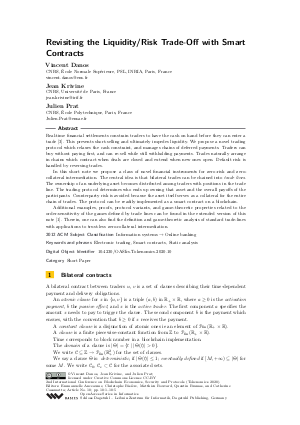Revisiting the Liquidity/Risk Trade-Off with Smart Contracts (Short Paper)
Authors Vincent Danos, Jean Krivine, Julien Prat
-
Part of:
Volume:
2nd International Conference on Blockchain Economics, Security and Protocols (Tokenomics 2020)
Part of: Series: Open Access Series in Informatics (OASIcs)
Part of: Conference: International Conference on Blockchain Economics, Security and Protocols (Tokenomics) - License:
 Creative Commons Attribution 3.0 Unported license
Creative Commons Attribution 3.0 Unported license
- Publication Date: 2021-02-02
File

PDF
OASIcs.Tokenomics.2020.10.pdf
- Filesize: 387 kB
- 5 pages
Document Identifiers
Subject Classification
ACM Subject Classification
- Information systems → Online banking
Keywords
- Electronic trading
- Smart contracts
- Static analysis
Metrics
- Access Statistics
-
Total Accesses (updated on a weekly basis)
0Document
0Metadata
Abstract
Real-time financial settlements constrain traders to have the cash on hand before they can enter a trade [Khapko and Zoican, 2017]. This prevents short-selling and ultimately impedes liquidity. We propose a novel trading protocol which relaxes the cash constraint, and manages chains of deferred payments. Traders can buy without paying first, and can re-sell while still withholding payments. Trades naturally arrange in chains which contract when deals are closed and extend when new ones open. Default risk is handled by reversing trades. In this short note we propose a class of novel financial instruments for zero-risk and zero-collateral intermediation. The central idea is that bilateral trades can be chained into trade lines. The ownership of an underlying asset becomes distributed among traders with positions in the trade line. The trading protocol determines who ends up owning that asset and the overall payoffs of the participants. Counterparty risk is avoided because the asset itself serves as a collateral for the entire chain of trades. The protocol can be readily implemented as a smart contract on a blockchain. Additional examples, proofs, protocol variants, and game-theoretic properties related to the order-sensitivity of the games defined by trade lines can be found in the extended version of this note [Danos et al., 2019]. Therein, one can also find the definition and game-theoretic analysis of standard trade-lines with applications to trust-less zero-collateral intermediation.
Cite As Get BibTex
Vincent Danos, Jean Krivine, and Julien Prat. Revisiting the Liquidity/Risk Trade-Off with Smart Contracts (Short Paper). In 2nd International Conference on Blockchain Economics, Security and Protocols (Tokenomics 2020). Open Access Series in Informatics (OASIcs), Volume 82, pp. 10:1-10:5, Schloss Dagstuhl – Leibniz-Zentrum für Informatik (2021)
https://doi.org/10.4230/OASIcs.Tokenomics.2020.10
BibTex
@InProceedings{danos_et_al:OASIcs.Tokenomics.2020.10,
author = {Danos, Vincent and Krivine, Jean and Prat, Julien},
title = {{Revisiting the Liquidity/Risk Trade-Off with Smart Contracts}},
booktitle = {2nd International Conference on Blockchain Economics, Security and Protocols (Tokenomics 2020)},
pages = {10:1--10:5},
series = {Open Access Series in Informatics (OASIcs)},
ISBN = {978-3-95977-157-3},
ISSN = {2190-6807},
year = {2021},
volume = {82},
editor = {Anceaume, Emmanuelle and Bisi\`{e}re, Christophe and Bouvard, Matthieu and Bramas, Quentin and Casamatta, Catherine},
publisher = {Schloss Dagstuhl -- Leibniz-Zentrum f{\"u}r Informatik},
address = {Dagstuhl, Germany},
URL = {https://drops.dagstuhl.de/entities/document/10.4230/OASIcs.Tokenomics.2020.10},
URN = {urn:nbn:de:0030-drops-135325},
doi = {10.4230/OASIcs.Tokenomics.2020.10},
annote = {Keywords: Electronic trading, Smart contracts, Static analysis}
}
Author Details
References
- Vincent Danos, Jean Krivine, and Julien Prat. Reversible and composable financial contracts, 2019. URL: http://www.di.ens.fr/~danos/tls.pdf.
-
Drew Fudenberg and Jean Tirole. Game theory, 1991. Cambridge, Massachusetts, 393(12):80, 1991.

-
Mariana Khapko and Marius Zoican. How fast should trades settle? Society for Financial Studies (SFS) Cavalcade, 2017.

